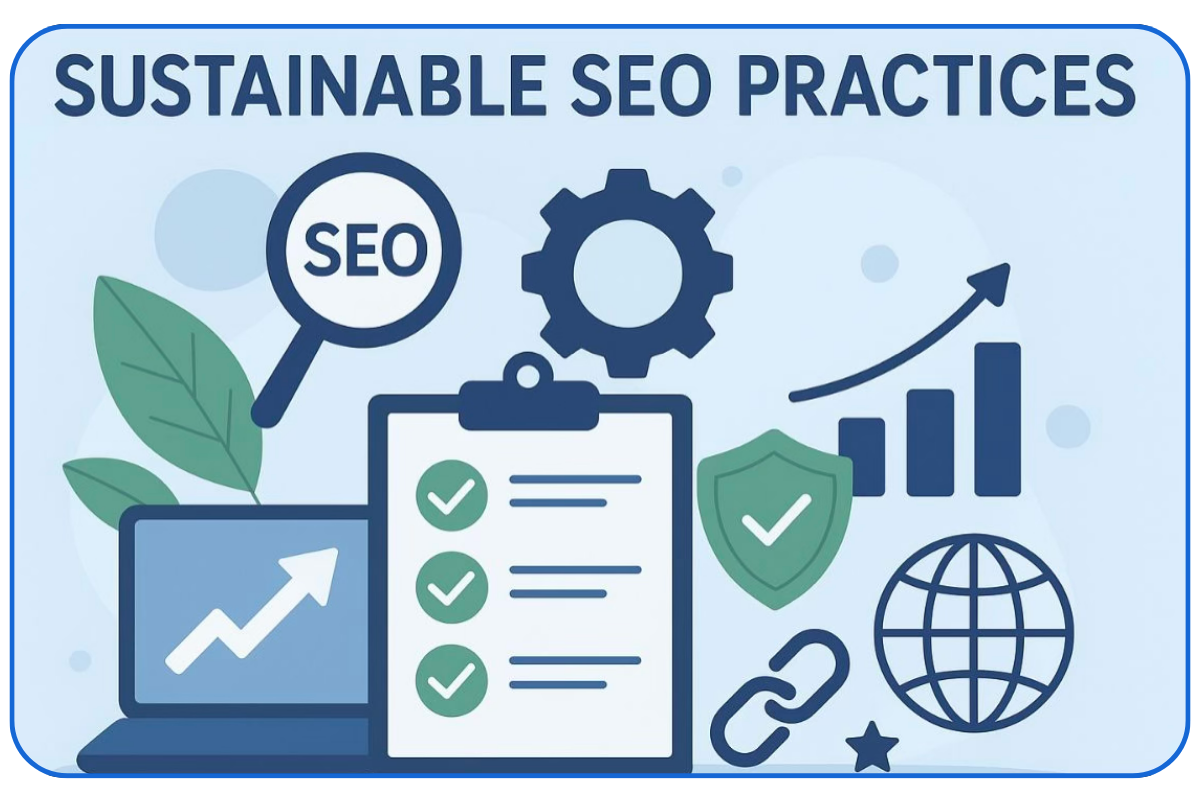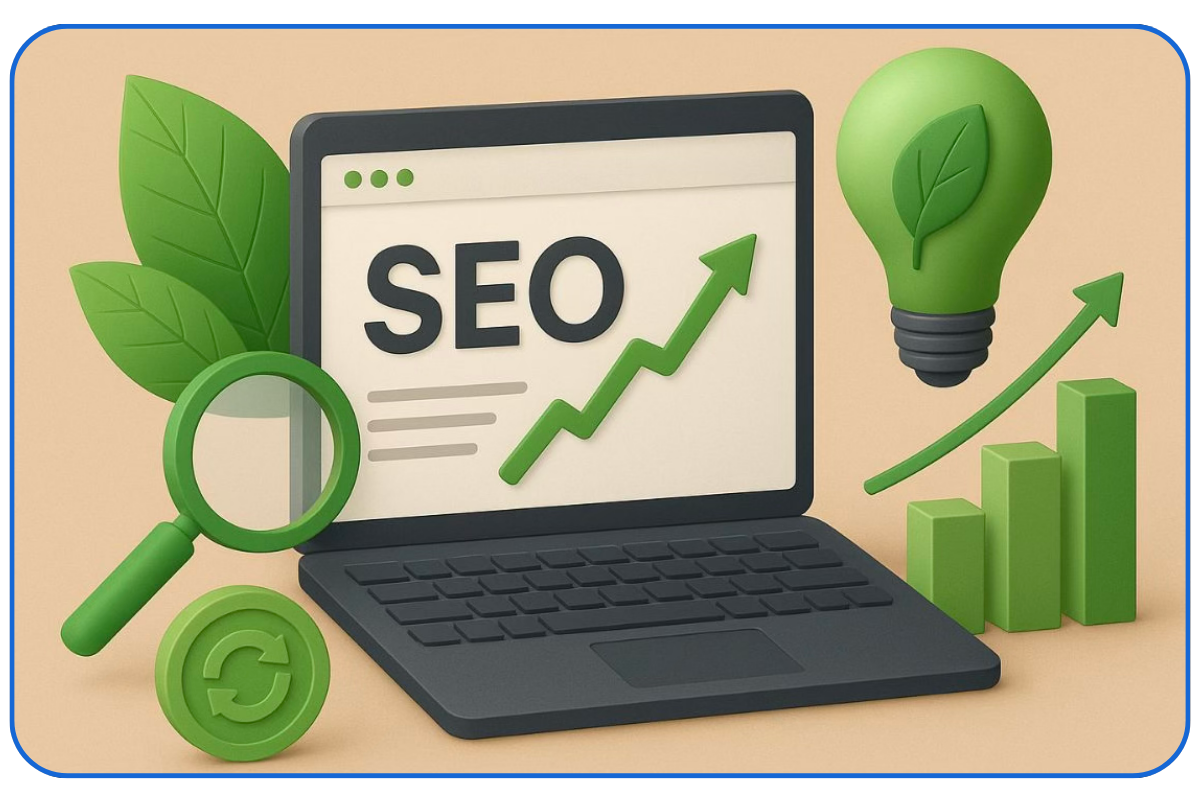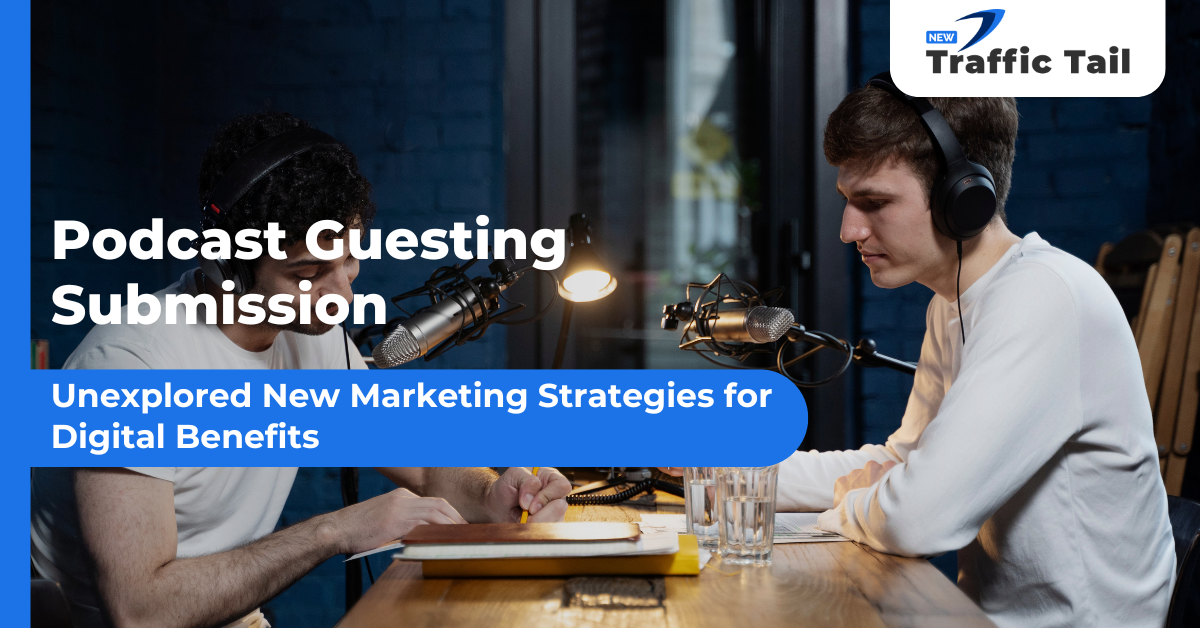Search engines show prioritization to brands that are concentrated on trust, values, and user experience. However, in recent years, Google has issued updates that have made one thing or another clear. The quick-fix approaches cannot work anymore. Sustainable SEO is real growth as it is focused on organic long-term visibility and credibility.
It is due to the shortcuts that many websites lose rankings. Sustainable SEO helps to avoid penalties for a site and to develop authority naturally and steadily. It has nothing to do with being manipulative with algorithms but with earning trust.

What is Sustainable SEO?
Sustainable SEO can be defined as those search engine optimization practices that target quality, authenticity, and user benefit. It does not use malicious practices like stuffing keywords, spamming, or search engine manipulation.
Sustainable SEO focuses on
- Value-filled content
- Honest and ethical associate earning.
- Organic ranking enhancement in terms of relevancy and usefulness.
Sustainable SEO does not require search engines to rank a page, but rather provides people with what they want when they are searching. Search engines will naturally reward the page when users spend more time, interact, and have confidence in the information.
Key Principles of Ethical SEO
Ethical search engine optimization is also important in the process of ensuring that a website is not victim to any punishment. Here are the core principles.
Continue using a user-first approach
Pages that are developed to benefit people are favored by search engines. The content must be clear in responding to search questions and easy to read. Rankings become better when the user is pleased.
Avoid risky SEO tactics
The manipulation of the search can appear quicker, but this can affect credibility. Harmful practices include
- Keyword stuffing
- Cloaking
- Spam link networks and link farms
- No value-added content
Google also conducts periodic audits of websites and may delete those that engage in such practices.
Long-Term SEO Strategies That Actually Work
Produce Quality Content
SEO is still based on quality content. The search engines reward useful, original, and well-structured pages. Strong content should
- Utilize important keywords in a natural way
- Follow clear formatting
- Concentrate on search intent answers
- Exhibit knowledge and precision
Real value addition will promote engagement and ranking.
Ethical link building using White Hat methods
One of the strongest ranking factors is still the backlinks. But ethically acquiring them is important. Ethical link earning encompasses
- Posting on the relevant websites
- Posting information materials that are consulted
- Online targeting of niche mentions
The backlink that search engines give preference to is the one that appears first, since the content is of real value.
Maintain a healthy technical setup
Technical SEO enhances the performance and increases the accessibility of your site to search engines. Focus on
- Fast page loading time
- Mobile-friendly structure
- Clean site architecture
- Secure HTTPS
- Optimized images and media
A good technical background enhances the experience and ranking capability.
Update content regularly
Updating of content indicates an active and relevant page. Even some basic enhancements, such as providing clarity to the text, including the most recent data, and better formatting, assist in keeping rankings the same in the long run.
Building Trust and Authority
The concept of sustainable SEO is not merely associated with ranking. It is concerning the formation of a credible presence. Search engines consider a website in terms of Experience, Expertise, Authority, and Trust. You can empower these aspects by
- Being factually accurate
- Internal linking by use of related pages
- Posting content in line with your niche
- Being on track with brand messaging
Authority builds gradually. The more one trusts, the better the ranking of stability becomes.

How to Measure Success in Sustainable SEO
Performance tracking allows realizing what is best. Rather than pursuing progress in terms of instant ranking growth, measure the progress using.
Organic search traffic
- Improvement of the position of keywords
- Time spent on the page
- Bounce rate
- Quality backlinks gained
These measures give a better picture of growth
Common SEO Mistakes to Avoid
These are mistakes to avoid to sustain long-term SEO results.
- Coercing keywords into sentences.
- Publishing useless skin content.
- Disregard of page speed or mobile experience.
- Spam backlinks or unearned backlinks.
- Accepting old pages in their current state.
Sustainable SEO is developed based on consistency, not shortcuts.
The Future of SEO
The search engines are more intelligent than ever. They are oriented to real value and the right information. The future of SEO is sustainable as it is beneficial to both the users and the search engines. Rankings of improvements naturally come after content solves real problems.
SEO is a long-term investment that enhances brand credibility, visibility, and provides stable organic traffic.
Read More:
Top SEO Link-Building Best Practices and Strategies
1000+ Free Backlinking Sites- The Ultimate Gem of SEO
Conclusion
Sustainable SEO emphasizes credibility, trust, and sustainable outcomes. It substitutes shortcuts with morality and actual value. When the content is useful and is made human-friendly, the search engines will reward it automatically.
Concentrate on gradual development and do not cut corners. Green SEO will remain the best option to have a reliable organic ranking.
Frequently Asked Questions
Q1- What makes SEO sustainable?
Sustainable SEO is all about playing the long game. It means you’re prioritizing quality, offering genuine value to users, and adhering to ethical strategies that truly endure. No shady tricks or quick hacks—just smart choices that keep your rankings steady over time.
Q2- How long does sustainable SEO take to show results?
It’s not instant, but you’ll usually notice things picking up after a few months. With sustainable SEO, you’re building momentum for the long term, so instead of big, short-lived jumps, you see steady, reliable growth.
Q3- Are backlinks important in sustainable SEO?
Absolutely, but only if you earn them the right way. It’s not about piling up as many links as possible—what really counts is the quality.
Q4- Can keyword stuffing affect ranking?
Definitely, if you cram in keywords just for the sake of it, search engines catch on and can hit your page with penalties.
Q5- Why does user experience matter in SEO?
Simple—when people stick around and actually use your site, search engines notice. A good experience builds trust and helps your rankings climb.




